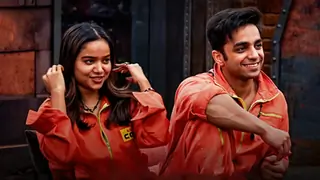The Mantra of Surprise
Rajiv Vijayakar
Posted online: Friday, December 16, 2005 at 0000 hours IST
Sajid-Wajid have neither been prolific nor pushy in their eight-year-old career as music directors. But their work has demonstrated a flair for variety that has not been seen or sensed in any of their contemporaries. With the exception of bhajans (and everyone knows how rare that genre is today!) Sajid and Wajid have composed virtually every kind of song in their film and non-film innings.
And that is not all. The brothers who are sons of ace tabla player Ustad Sharafat Khan have neither taken their success for granted nor had the insecurities that made them go on a signing spree after their first, second, third or later burst of successes. "Good work takes time for us," they state almost in chorus.
One would not blame the reader if he is not familiar with Sajid-Wajid's detailed track-record, for one has to pay the price for not manipulating the media, shouting about ordinary achievements from the rooftops, shirking professional and personal controversies and spats, and focusing single-mindedly on work! The brothers have composed the biggest-selling basic album ever in Indian music history (Deewana on T-Series), pioneered the music label's 28 Non-Stop Remix series with creative rather than irreverent remixes, and got their first brush with fame with their compositions for Marhaba, the Sabri Brothers' album.
They began their film innings with the solo but standout qawwali 'Teri jawani badi mast mast hai...' in Salman Khan's home production Pyaar Kiya To Darna Kya, moving on to four songs in their Hello Brother ('Area ka hero hoon...', 'Chupke se koi aayega...', 'Hataa saawan ki ghata...' and the title-track). The variety was already on impressive display - from the beginning.
But the brothers moved on to even better work encompassing a wider range. There were sparks even in a mediocre action product like their first solo enterprise, Baaghi (2000), in many a piecemeal work that they kept doing in films like Yeh Zindagi Ka Safar, Tumko Na Bhool Paayenge, Gunaah, Hum Tumhaare Hain Sanam and Tere Naam.
On the solo front, Kya Yehi Pyaar Hai (the Tips production that they 'earned' because of their good work in the Tips-Alka Yagnik-Babul Supriyo album Khoya Khoya Chand), Gurudev Bhalla's Shararat and above all Milan Luthria's musically-brilliant Chori Chori proved that S and W were no fly-by-night music makers who had come and cashed in because of the twin propellants of a mentor and a lucky break. Sajid-Wajid meant business, and their music made an impression even in B-grade films like AK-47, Dreams and Hot Mashooqa.
2004 saw Sajid-Wajid emerge as the Screen nominees for Best Music for the David Dhawan hit Mujhse Shaadi Karogi, with hits like the title-track, 'Lal dupatta...' and 'Aaja soniye...' besides scoring most of the songs for Garv. And in this year, they have given us one of the very few worthy basic albums, Tera Intezar, showcasing Rahul Vaidya's skills, and the fresh score of Jawani Diwani, where their flair for variety is on display again.
Screen chats up the brothers, and their answers, solo or as a duet, demonstrate a complete harmony and resonance in thought. Excerpts:
Tera Intezar is a refreshingly good album in a scenario where the basic music scene is completely below par. How did you approach this debut album of a professionally raw singer like Rahul Vaidya?
Sajid: Rahul's voice is mellow, romantic and what is known as a hero's voice. We met and interacted with him to feel the various shades and sides to his talent. Rahul is very hardworking. We made him sing everything from light, passionate to pensive and peppy songs.
Among the Indian Idol or any other talent hunt finalists, this is probably the first album to have completely original tracks, no remixes and a single entity each on lyrics and music.
Wajid: Yes, that is what inspired us when Sony-BMG offered the album. We had earlier turned down Abhijeet Sawant's album because they only wanted two tracks from us. It takes time to understand a new singer and we are not interested any longer in such piecemeal work.
Sajid: Incidentally, we have worked with Prajakta Shukre in a duet in the album, Abhijeet himself and with Rahul Saxena in Jawani Diwani.
Wajid: Prajakta, who sang a duet in Tera Intezar and Abhijeet are also good singers, Abhijeet having the advantage of a hero's voice. Rahul Saxena is a very good, and the song he has sung for us in Jawani Diwani along with two other equally talented singers, Shadaab Faridi and Arif Shaikh, proves it. This is a layered, difficult Indian-meets-fusion composition, and never will you once feel that these three singers have sung professionally for the very first time.
Who are Shadaab and Arif?
Wajid: I have known Shadaab for years now. Arif is another new talent who approached us. Hamza, a singer from Saudi Arabia, is our fourth new discovery in Jawani Diwani in which he has sung 'Dil deewana...' with Sonu Nigam and Soumya Raoh which is making waves.
We want to work with a lot of newcomers as well as have a variety even in the established singers. We used a whole lot of fresh or upcoming singers like Aravinder and Sneha Pant in Shararat, which had completely situational songs, four years ago. Among the established singers, we dared to use Adnan Sami with the Sabri Brothers for the Sufiana qawwali 'Roothe yaar nu manaa le...' in Chori Chori, musically one of our most satisfying films to date. In the same film, we gave Sunidhi Chauhan the soft, crooning 'Main ek ladki...' at a time when she was made to belt out fast-paced item numbers. Our singers have ranged from Talat Aziz, Shubha Mudgal, Fareeda Khan and Afroz Banu to Suzaan, Bhairvi and Shraddha Pandit.
There are two more music makers in Jawani Diwani.
Wajid (Shrugs): The film came to us after they had got the title-track from Clinton. But the other song was done without our knowledge. Unfortunately this is very common and happens with every music director today.
When you composed music for films like Chori Chori, Shararat or Jawani Diwani , titles that have a musical reputation, do you sense any pressure or challenge to measure up to the older score?
Wajid: Not really. The requirement of the subject and its maker has to take precedence over such things. The definition of a youthful score in 2005 is not what it was in 1972 when the older Jawani Diwani was released. And we never take our work lightly. We like to experiment and mull over our compositions.
Despite your talent, the range, variety and substance in your work, as well as big-time successes, Sajid-Wajid have not yet big time. Why?
Wajid: Taqdeer sabse badi cheez hoti hai. We get nothing less or nothing more than is destined.
Sajid: But we are not complaining. We lead simple, unostentatious lives. We are not in the rat-race because for our family music is not a business. Our main motto is to make our films more musical and aesthetic and not merely fulfill a commercial need of 45 minutes! For that we understand scripts and design a film musically. And we have to also make sure that this music is saleable. In our family and lineage, music is something to be dedicated to and not just a means of making money. This is why we have done so many small films wherein we believed in the filmmaker, like AK-47.
Wajid: In any case, creativity takes time and you have to give something time to get beautiful returns. We would rather experiment at work than do chhal kapat with it! Everyone has a different work capacity. It is for the music director to ensure that his work isn't spoilt by taking on work in excess of his ability and creativity.
But today music is suffering even though the busiest composers are nowhere as busy as past prolific names like Shankar Jaikishen, Kalyanji Anandji, R.D. Burman or Laxmikant-Pyarelal. They would even compose the background music, which your generation hardly does nowadays. So is it really only about capacity?
Wajid: Well, the scenario was completely different then. There was one music company, one TV channel, no FM and very little external influences. Basic albums as a genre then were also virtually restricted to niche genres like ghazals, qawwalis and bhajans.
Today it is different. Yeh jo kuch naya karne ka chakkar hai yehi music ka satyanaash kar rahaa hai! Somewhere the listeners too have got corrupted to a point. Today's demand is excessive attention on execution and packaging. This is something good per se, but what is happening is that this is taking place at the expense of the composition. Also simplicity is no longer in fashion - and that is the primary need for a song to endure!
So what is your approach to all these changes?
Wajid: Change is always the keyword. Hit films and songs dictate trends and affect audience tastes every six months or so. Obviously, you cannot face a torrent alone and you have to flow in the direction of the tide each time. And this is a worldwide phenomenon. The test of our art lies in combining the old and the new. The smart music director mixes trends with what he wants to do. The rest is naseeb!
Today, for example, we are looking even more towards the West in music. We have no problem with that. For decades we Indians have gone abroad for higher studies so that we could come back with the good things we learnt there and employ them here by blending with our things. This is the approach we need to have - blend the best from the West but not forget ourselves.Today live recording is gone, programming is in. A music maker has to be in sync with what everyone wants. Hamara music doosre sunte hain! Hum ghar ke liye gaane nahin banaate!
Sajid: Film music is teamwork. One cannot be rigid about anything. Crores of rupees and so much prestige are involved in every film. The capability of a music composer lies in his ability to give good music in a bure se buri situation, and to try and ensure good lyrics too. That is why among present music directors I admire Anu Malikji. He is the best we have today and he can deliver whatever everyone wants and yet do his own thing.
You talked about execution. But there is nothing today like a Sajid-Wajid stamp. Do you think things would have been better if you had a distinctly identifiable style?
Sajid: We do have a stamp - the stamp of melody! Maybe we will evolve a style in time - we have hardly done a dozen complete films. But we want to spring surprises on our listeners each time, so we will not be working on a fixed style in that sense, as too much of this can be restricting! We want to grow! We want people to say, "Hey! That does not sound like Sajid-Wajid!" or "Oh, they can do that too?"
Wajid: Yes. Those who have heard Deewana, Marhaba, 28- Non-Stop Remix, Kya Yehi Pyaar Hai, Shararat, Tumko Na Bhool Paayenge, Chori Chori and Mujhse Shaadi Karogi find it interesting to know that all these songs are composed by the same two people! We want them to think, "What will they do next?"Also, we are never repetitious even within one genre. Like for example, our qawwalis in three different films - Pyaar Kiya To Darna Kya, Kya Yehi Pyaar Hai and Chori Chori have been completely different in structure and flavour from each other.
Sajid: We do not think that any of our contemporaries have demonstrated this range, though they are all doing good work. Even among the veterans, we saw this kind of phenomenon. Like Madan Mohan was amazing but did not have the variety of Shankar Jaikishan. Roshan and R.D.Burman were mind-blowing, but lacked the surprise quality that made Laxmikant Pyarelal last so much longer than them.
Wajid: We want respect, not just money. The other day someone told me that his entire family still listens frequently to Chori Chori. That is the credit and credibility we have earned. That is what we love and crave to hear and what spurs us on. Success and popularity alone are just a matter of destiny.
Salman Khan, your mentor, has never given you a solo film.
Sajid: Yes, but we don't question that. He is our mentor.
T-Series never offered you an album despite the record-breaking Deewana.
Sajid: Some things are beyond analysis!
So which are the films you have on hand now?
Sajid: We have Rumi Jaffrey's God Tussi Great Ho and Mahesh Bhatt's Killer and we have completed work on Glenn-Ankush's Jaane Hoga Kya.

























